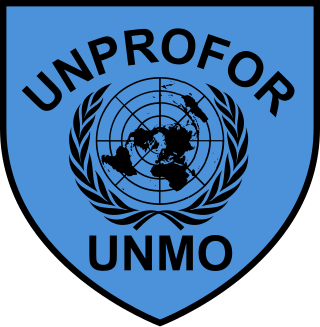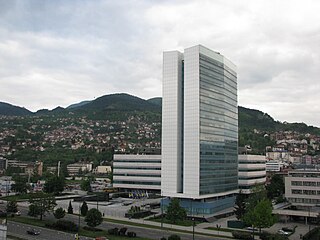
The Balkans, corresponding partially with the Balkan Peninsula, is a geographical area in southeastern Europe with various geographical and historical definitions. The region takes its name from the Balkan Mountains that stretch throughout the whole of Bulgaria. The Balkan Peninsula is bordered by the Adriatic Sea in the northwest, the Ionian Sea in the southwest, the Aegean Sea in the south, the Turkish straits in the east, and the Black Sea in the northeast. The northern border of the peninsula is variously defined. The highest point of the Balkans is Musala, 2,925 metres (9,596 ft), in the Rila mountain range, Bulgaria.

The State Union of Serbia and Montenegro or simply Serbia and Montenegro, known until 2003 as the Federal Republic of Yugoslavia, FR Yugoslavia (FRY) or simply Yugoslavia, was a country in Southeast Europe located in the Balkans that existed from 1992 to 2006, following the breakup of the Socialist Federal Republic of Yugoslavia. The state was founded on 27 April 1992 as a federation comprising the Republic of Serbia and the Republic of Montenegro. In February 2003, it was transformed from a federal republic to a political union until Montenegro seceded from the union in June 2006, leading to the full independence of both Serbia and Montenegro.

Yugoslavia was a country in Southeast and Central Europe that existed from 1918 to 1992. It came into existence following World War I, under the name of the Kingdom of Serbs, Croats and Slovenes from the merger of the Kingdom of Serbia with the provisional State of Slovenes, Croats and Serbs, and constituted the first union of South Slavic peoples as a sovereign state, following centuries of foreign rule over the region under the Ottoman Empire and the Habsburg monarchy. Peter I of Serbia was its first sovereign. The kingdom gained international recognition on 13 July 1922 at the Conference of Ambassadors in Paris. The official name of the state was changed to the Kingdom of Yugoslavia on 3 October 1929.

The Yugoslav Wars were a series of separate but related ethnic conflicts, wars of independence, and insurgencies that took place from 1991 to 2001 in what had been the Socialist Federal Republic of Yugoslavia. The conflicts both led up to and resulted from the breakup of Yugoslavia, which began in mid-1991, into six independent countries matching the six entities known as republics that had previously constituted Yugoslavia: Slovenia, Croatia, Bosnia and Herzegovina, Montenegro, Serbia, and Macedonia. SFR Yugoslavia's constituent republics declared independence due to unresolved tensions between ethnic minorities in the new countries, which fueled the wars. While most of the conflicts ended through peace accords that involved full international recognition of new states, they resulted in a massive number of deaths as well as severe economic damage to the region.

The United Nations Protection Force was the first United Nations peacekeeping force in Croatia and in Bosnia and Herzegovina during the Yugoslav Wars. The force was formed in February 1992 and its mandate ended in March 1995, with the peacekeeping mission restructuring into three other forces.

After a period of political and economic crisis in the 1980s, the constituent republics of the Socialist Federal Republic of Yugoslavia split apart, but the unresolved issues caused a series of inter-ethnic Yugoslav Wars. The wars primarily affected Bosnia and Herzegovina, neighbouring parts of Croatia and, some years later, Kosovo.
Workers' Aid for Bosnia was founded in London, United Kingdom in 1993, after a call by the Campaign Against Fascism in Europe (CAFE). Sixty people – socialists, trade unionists and Bosnian refugees – met to discuss how to organise solidarity with those people in ex-Yugoslavia defending a united, multi-ethnic Bosnia and Herzegovina. Workers' Aid was supported by the International Socialist Group, the USFI, and the Workers Revolutionary Party. However, there was rivalry between these groupings which did not help the solidarity project.
Sally Becker is a British humanitarian aid worker, best known for her work during the Bosnian and Kosovo Wars in the late 1990s. She is the founder of charities Road to Peace and Save a Child. She is credited with saving hundreds of lives through her actions in the Balkans, and was frequently referred to in the British media as the "Angel of Mostar".

Greece and Serbia enjoy close diplomatic relations, which have traditionally been friendly due to cultural, religious and historical ties between the two nations.
Aid Convoy is a British charitable organisation running and supporting various humanitarian aid projects, mostly in Eastern Europe. Its aims are achieved primarily by means of running convoys.

Operation Tiger 94 was a military action in the summer of 1994, by the Army of the Republic of Bosnia and Herzegovina (ARBiH) against the Bosnian autonomous zone of the Autonomous Province of Western Bosnia, its leader Fikret Abdić and his Serbian backers the Army of the Republic of Serb Krajina (SVK), and the Army of Republika Srpska (VRS). The battle was a huge success for the ARBiH, which was able to rout Abdić's forces and occupy the territory of Western Bosnia. Fikret Abdić was able to recapture the territory in November 1994 in Operation Spider.
Marko Attila Hoare is a British historian of the former Yugoslavia who also writes about current affairs, especially Southeast Europe, including Turkey and the Caucasus. Hoare is Associate Professor of History at the University Sarajevo School of Science and Technology, in Sarajevo.
Viva Palestina is a British-based organisation formerly registered as a charity. The body came into being in January 2009 with the initial intention of running a convoy of humanitarian aid to the Gaza Strip. Its aims are the "provision from the UK of food, medicine and essential goods and services needed by the civilian population" [of the occupied Palestinian Territories] and "highlighting the causes and results of wars with a view to achieving peace."

Slobodan Milošević was a Yugoslav and Serbian politician who was the President of Serbia between 1989–1997 and President of the Federal Republic of Yugoslavia from 1997 until his оverthrow in 2000. Milošević played a major role in the Yugoslav Wars and became the first sitting head of state charged with war crimes.

Serbia, as a constituent subject of the SFR Yugoslavia and later the FR Yugoslavia, was involved in the Yugoslav Wars, which took place between 1991 and 1999—the war in Slovenia, the Croatian War of Independence, the Bosnian War, and Kosovo. From 1991 to 1997, Slobodan Milošević was the President of Serbia. The International Criminal Tribunal for the former Yugoslavia (ICTY) has established that Milošević was in control of Serb forces in Bosnia and Herzegovina and Croatia during the wars which were fought there from 1991 to 1995.
Humanitarian Law Center (HLC) is the Serbian non-governmental organisation with offices in Belgrade, Serbia, and Pristina, Kosovo. It was founded in 1992 by Nataša Kandić to document human rights violations across the former Yugoslavia in armed conflicts in Croatia, Bosnia and Herzegovina, and, later, Kosovo.

Between 13 and 18 May 2014 a low-pressure cyclone designated Tamara and Yvette affected a large area of Southeastern and Central Europe, causing floods and landslides. Serbia and Bosnia and Herzegovina suffered the greatest damage, as the rain was the heaviest in 120 years of recorded weather measurements. By 20 May, at least 62 people had died as a result of the flooding, and hundreds of thousands had been forced from their homes. Towns of Obrenovac in Serbia and Doboj in Bosnia and Herzegovina account for most victims, after being inundated by several-meter high waters from nearby rivers.
Convoy of Hope is an American faith-based nonprofit humanitarian and disaster relief organization that provides food, supplies, and humanitarian services to impoverished or otherwise needy populations throughout the world. The organization also engages in disaster relief work. It was founded in 1994 by Hal, Steve, and Dave Donaldson in Sacramento, California, later moved its headquartered to its current place in Springfield, Missouri, and is associated with the Assemblies of God and its Chi Alpha campus ministries and fellowships.

The Dayton Agreement ended the Bosnian War and created the federal republic of Bosnia and Herzegovina (BiH), which consists of the Bosniak and Croat-inhabited Federation of Bosnia and Herzegovina (FBiH) and the Serb-inhabited Republika Srpska (RS). Although the Bosnian Serbs were viewed as "anti-Dayton" during the first years after the war, since 2000 they have been staunch supporters of the Dayton Agreement and the preservation of RS. Bosniaks generally view RS as illegitimate, and an independence referendum from BiH has been proposed in RS. The 2006 Montenegrin independence referendum and Kosovo's 2008 declaration of independence have raised the possibility of a referendum and unification with Serbia. In 2015, after a judicial and police crisis, the governing Alliance of Independent Social Democrats said that it would hold an independence referendum in 2018 if RS's autonomy was not preserved. Almost all people vote for pro-independence parties.

The reaction in Greece to the Yugoslav Wars refers to the geopolitical relations between Greece and the countries that emerged from the breakup of Yugoslavia as a result of the Yugoslav Wars, as well as the international stance of the former during the years of the conflict in terms of activities by state and non-state actors.












